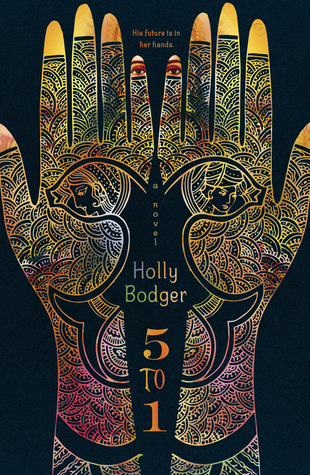Title: 5 to 1
Author: Holly Bodger
Rating: 2/5
Summary:
In the year 2054, after decades of gender selection, India now has a ratio of five boys for every girl, making women an incredibly valuable commodity. Tired of marrying off their daughters to the highest bidder and determined to finally make marriage fair, the women who form the country of Koyanagar have instituted a series of tests so that every boy has the chance to win a wife.
Sudasa doesn’t want to be a wife, and Contestant Five, a boy forced to compete in the test to become her husband, has other plans as well. Sudasa’s family wants nothing more than for their daughter to do the right thing and pick a husband who will keep her comfortable—and caged. Five’s family wants him to escape by failing the tests. As the tests advance, Sudasa and Five thwart each other at every turn until they slowly realize that they just might want the same thing.
This beautiful, unique novel is told from alternating points of view—Sudasa’s in verse and Contestant Five’s in prose—allowing readers to experience both characters’ pain and their brave struggle for hope.
Review:
This book left me wanting a lot. The first thing that drew me in was the magnificent artwork on the cover, and next that the majority of the book was in poetry. However, those two points are about the only things I liked about this book.
I love dystopian novels, but this felt as disjointed as an imagined future world seems to be. The writing was loose and there several grammatical errors that I'm unsure how they passed editing. The concept was very interesting, especially considering China's one-child policy and the likelihood of this situation (outnumbering girls) will happen in that country.
The first time the author switched points of view I was lost. The paragraphs were dense blocks of text with little meaning and less emotion. This story could have gone two ways, and should have chosen one of these paths: [1] been a short story of no more than 75 pages and only in Sudasa's point of view; or [2] been lengthened by at least 100 pages and have Kiran's point of view more developed.
Lastly, the title is just ridiculous. It makes the book hard to search for and while it applies to the book well, I think something symbolic of the poems that were mentioned would have been a much better fit.

No comments:
Post a Comment